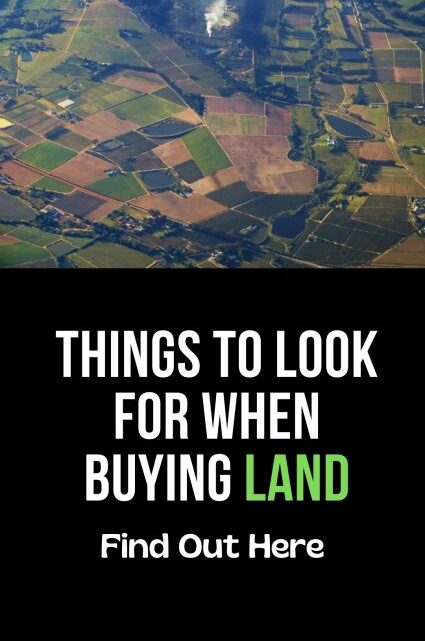What to Consider Before Buying Land
Are you considering buying a plot of land? Buying your first piece of land is an exciting but long process. There are many things to consider before you settle on a plot of land.
Are you going to finance the purchase? If so, will you be getting home construction financing or going with one of the loans for land available?
Understanding what you need from the property to ensure that you’re comfortable both personally and professionally is vital.
Here are some things to look at when you buy some land. Doing proper due diligence is essential to being truly happy with your land purchase.
A Great Location
Are you someone that wants to be in a rural area where there are maybe two people that live near you? You want to check out the land for sale in a city where you have easy access to stores, theaters, and other fun outlets nearby. It all depends on the short and long-term goals.
Maybe you want to raise a family and need some privacy but don’t want to be too far from schools. You have to think about your children and their future. You might want to have freeway access that’s 20-30 minutes away from your job.
If you’re still working in corporate America, it’s imperative to have an easy way to get to the office once you move. Are you thinking about buying a piece of land close to the beach when you retire? Consider all of these factors to make a better decision.
The Costs of the Land
If you can’t buy it outright, find out the land mortgage. Make sure you have a plan to pay the mortgage in a reasonable time depending on the choice. If you’re developing raw, it’s more expensive than asking for a loan to improved land.
Improved land has seen some development on it already, so you won’t have to start from scratch. Also, lenders can be lenient by letting you do a 20% down payment instead of 50%. However, they still want to know your credit, income, and job background to verify how you intend to pay things off.
Also, you may need a construction loan if you intend to build things on the land. It might be anything from creating an agricultural structure if you’re raising farm animals to make products, vegetables, and other things that require money to start.
If you can’t get a land loan from a lender or a bank, you may be able to ask the owner of the land for financial assistance. These are some of the beginning costs to acquire land. Remember, there are other factors to consider before you begin the process.
Check for Land Issues
Before you pull the trigger on a payment, always do your background research. Talk to a Realtor who does business in the area you intend to live and work. If there are any properties you have your eye on, they’ll see if they’re worth your time.
All areas have zoning requirements, and the place you choose might not be the right fit. Check if there are specific guidelines that supersede your reason to purchase the property.
For example, you may want to build a commercial property like a store or a manufacturing building. A zoning requirement may give you specifications on how wide and tall you can make the structure.
However, it may not be enough for what you plan to do for your business. These restrictions may prevent you from using the property as you originally intended.
Another thing to look at is the land itself. Is the land elevated in a manner that prevents you from building a property on it? Also, the soil may prevent you from digging a well or giving you electricity.
You have to look at the natural resources and see whether or not they interfere with how you want to live your life on the land. Are there any easements that could prevent you from doing what you want?
It’s good to consult with a Realtor because they understand the process. From the paperwork and guidelines, a real estate agent can give you details of the property. They’ll tell you if it’s worth buying or you need to move on to something else.
What Utilities Are Available?
Some properties on homes are undeveloped to the point of not having any utilities available. If that’s the case, be prepared to spend some serious money on it. You’ll need to find out how to put a water or electricity line in if there isn’t one under the ground yet.
Also, what’s the cable and phone service like in the area? You might live in a place where the reception isn’t clear. It’ll put a damper on you speaking with clients if you need to stay connected through a virtual system. Additionally, you may have family members who live in another state.
Think about other necessities, such as cooking, bathing, clean water, and other things that require a power and water source. You may need someone to come to the house and put a line in the home. That’ll be an extra fee you need to pay for the convenience.
Even though you’ll have more privacy and land in a rural area, you have to weigh the cost of that convenience versus modern luxuries. In a rural area, it can be extra work to put in these modern amenities. As a result, you’ll have to spend thousands of dollars you may not have accounted for in your budget.
If you can’t get a traditional electricity source, solar power may be an option. If you see that the house gets tons of sunlight, this may be a better alternative solution. While it’s pricey at first, the investment can save you tremendous costs in the long run as long as it doesn’t destroy your home’s curb appeal.
Also, you may need a well and a reliable septic system for your rural home. You must maintain these properly to have a clean water source and safely dispose of biological waste.
Are There Environmental Hazards?
It’s a fully loaded question. One of the first things to check is the soil. Is it fertile enough to grow crops if you plan to sell fruits and vegetables? Maybe you want to create organic products from your plot of land.
If the soil is barren or not fit to grow things, it may be a waste of investment.
Additionally, you want to see if there are any pests around. If you’re raising farm animals, make sure you don’t live in a place where it attracts coyotes, foxes, bears, or other animals that would be a predator to your fresh produce.
Not to mention, there may be pests, such as bugs, possums, and other small critters that eat the vegetation you grow in the soil.
Speaking of soil, you need someone to survey the land to make nothing is contaminating. The land may have been a dumping ground for a business that used toxic materials.
It’s best to get a preliminary study of the property to see if there are chemical storage tanks or contaminated water so that you and your family stay safe.
What Are Your Natural Resource Rights?
When you’re about to purchase rural property, always consider this aspect of your land. Remember, you may have the property. However, a company may own the water, timber, and other things.
Water Rights
You may want to use the pond near you to have fresh water for your animals. However, the state may restrict you from using that water because it may source to a local business that uses it. State legislation may deem that your farm animals may contaminate the water.
Additionally, you might not be able to raise farm animals on your land if the water is too close to your home. Always know your water rights before moving to the property.
Mineral Rights
Mineral rights are a bit tricky. Here you’ve bought a rural property where you don’t want to be bothered. You may have a pure oil source right underneath your land.
While you may own the lot, another company may have exclusive rights to drill oil. Even if the drilling is noisy, you have no right to stop the company from getting the oil.
Timber Rights
You may live in an area with lots of trees. Find out if you own the trees on your land. Otherwise, a company may regularly chop them down for a natural resource to help them profit.
Access Rights
Is the land you intend to purchase connected to government property or a private entity? Make sure that you have permission to use it. It can get complicated when you’re driving home, and you can’t get to your house because you have to go through government or private land to get to your place.
Before you purchase land, you have to consider many things before making a final decision. Think about how close it is to your kid’s school or your job. Make sure that it’s not contaminated.
Make sure it has working utilities to make things more convenient. If you plan to grow vegetables or raise farm animals, make sure there aren’t any codes preventing you from doing your job.
Speak with a real estate agent who knows the lay of the land to help you purchase the right piece of land for you and your family.
About the author: The above article on things to look for when buying land was written by Ray Lion. Ray became a Realtor with an aspiration of being a sales leader in the market. With him, he took all of his experience in sales, negotiating, marketing, design, and educational background to excel in his new career. He enjoys providing helpful real estate guidance to buyers and sellers.











If a land buyer doesn’t perform a comprehensive review of the property they are buying, there’s no one to blame but themselves when they discover some potentially very expensive issues.